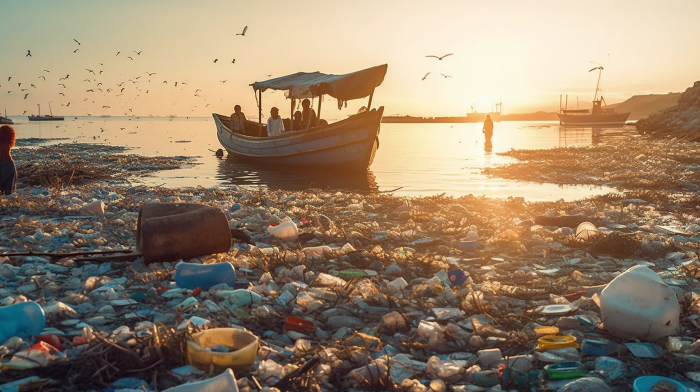
The recent call to action by two UN independent experts, David R. Boyd and Marcos Orellana, regarding the escalating issue of plastic pollution is a crucial reminder of the threat it poses to human rights. As our oceans continue to be inundated by a mounting tide of plastic waste, the need for immediate global action becomes increasingly evident. This call coincides with ongoing negotiations for an international treaty on plastic pollution, emphasizing the urgency and significance of the matter at hand, especially in the lead-up to World Environment Day.
Boyd and Orellana shed light on the exponential surge in plastic production over the past few decades, resulting in a staggering 400 million tonnes of plastic waste generated annually. Describing it as a ‘toxic tidal wave,’ they highlight the far-reaching consequences that this pollution has on our environment and its detrimental impact on human rights across the entire life cycle of plastic.
What makes this issue even more alarming is the fact that each stage of the plastic production and disposal process infringes upon our fundamental rights to a healthy environment, life, health, food, water, and an adequate standard of living. The production of plastic releases hazardous substances and heavily relies on fossil fuels, while the composition of plastic itself contains toxic chemicals that pose risks to both humans and nature. Shockingly, approximately 85% of single-use plastics end up in landfills or are irresponsibly dumped into the environment. Incineration, recycling, and other insufficient solutions, as criticized by the experts, only serve to exacerbate the problem. Furthermore, the pervasive presence of plastic and microplastics, along with their associated hazardous substances, in our daily consumption of food, water, and even the air we breathe, is deeply concerning.
The experts also draw attention to the disproportionate impact of plastic pollution and waste on marginalized communities. These vulnerable groups often reside in areas known as “sacrifice zones,” situated near facilities such as open-pit mines, petroleum refineries, steel plants, and coal-fired power stations. Their exposure to plastic pollution further compounds the existing environmental injustices they face.
It is important to recognize that plastic pollution not only poses a direct threat to human rights but also contributes significantly to climate change—a crucial aspect that is often overlooked. The presence of plastic particles in our oceans obstructs the ability of marine ecosystems to effectively remove greenhouse gases from the atmosphere, exacerbating the challenges of global warming.
As we navigate these critical issues, the resolutions adopted by the UN Human Rights Council and the UN General Assembly in recent years, acknowledging the right to a clean, healthy, and sustainable environment, provide an essential framework for action. They should serve as a guiding force, inspiring initiatives and policies aimed at addressing plastic pollution on a global scale.
The ongoing negotiations for an internationally binding treaty on plastic pollution, with a particular focus on marine environments, are of utmost importance. As projected by the UN Environment Programme, the volume of plastic waste entering aquatic ecosystems could reach a staggering 23 to 37 million tonnes per year by 2040. The second meeting of the Intergovernmental Negotiating Committee on Plastic Pollution (INC-2) currently taking place in Paris marks a crucial milestone in this process. With a deadline of 2024 to reach an agreement on the treaty, the delegates must work diligently to ensure the protection of our oceans and the preservation of our collective future.
In conclusion, the urgency to address plastic pollution and protect our oceans cannot be overstated. The “toxic tidal wave” of plastic waste jeopardizes not only our environment but also the very essence of human rights. It is incumbent upon us, as individuals, communities, and nations, to take immediate and concerted action to combat this crisis and

